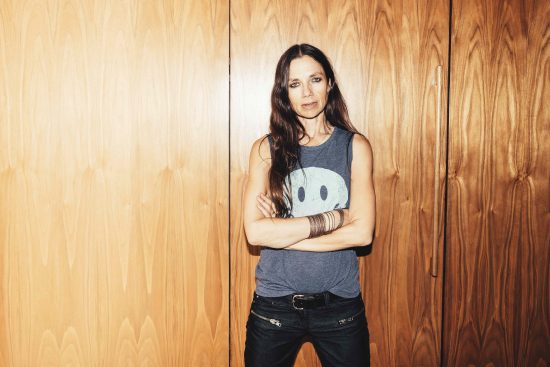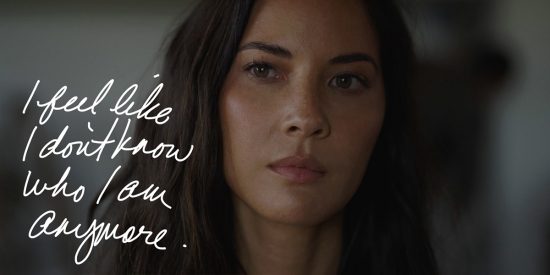Justine Bateman on Her New Film ‘Violet’ and Living Fearlessly

Photo by Steven Meires Dominguez
Justine Bateman wants you to live fearlessly. She wants to free you from that voice in your head that is holding you back. Her hope is that her feature directorial debut, Violet, provides you with a roadmap to do just that. Her long brown hair falling loosely over her shoulders, Bateman is personable and welcoming during our Zoom chat. Virtual press days can take some of the intimacy away from an in-person conversation, but she is easy-going and open, a born storyteller, ever-enthusiastic (deservedly so) over her newest project.
At 55, Bateman is the wearer of many hats. The mother of two is a producer, director, and actor. She’s a screenwriter and the author of two books, Fame: The Hijacking of Reality which was published in 2018 and Face: One Square Foot of Skin, released earlier this year. She once had her own clothing line. She’s a 2016 UCLA graduate, having gone back to school at 46 to get a degree in computer science. She testified at a U.S. Senate committee hearing promoting net neutrality of the Internet. She was on the board of the Screen Actors Guild. She’s a licensed pilot and certified scuba diver. Is there anything she can’t do? I certainly feel based on our conversation, that there isn’t anything she won’t at least try.
Of course, most of us who were around in the 80’s know Bateman as Mallory Keaton from the beloved comedy show Family Ties. The series, which also starred Michael J. Fox, Michael Gross, Meredith Baxter, and Tina Yothers, ran from 1982-1989. But acting just wasn’t Bateman’s lifelong ambition, she’d wanted to direct since she was 19, and fate just happened to push her along. “My career it just turned, there was nothing I could do about it. It shifted and the acting just wasn’t happening anymore,” she says. “It was clear that my life had just shut that door.” With writing and producing coming first, directing eventually followed and this career change is something Bateman seems ever thankful for. “My God, if that door hadn’t shut, I don’t know how much of this I would have wound up doing. And now there’s so many films I want to make. It’s very exciting.”
Bateman’s first foray behind the camera was with her short film Five Minutes, which showed at the 2017 Toronto International Film Festival. The film hilariously recounts a parenting group learning about how to listen better to their children (you can watch it on Vimeo here). Next up was the short PUSH, which Bateman adapted from a short story by Holiday Reinhorn (available here). It was just the right way to test the waters. “If anyone believes that they are a filmmaker and they want to go about making a film, I highly recommend making a short first,” Bateman advises. “Not only is it good practice, it’s a great way to find out how you want to work as a filmmaker. And it’s a lot easier to find that out when you’re shooting a 10 minute short within a couple of days, than when you’re on a 19 day shoot and there’s a lot more money behind it.” She also recommends doing it for no money, just to have less pressure. “Try to do it at locations that you have access to. Try to do it with actors you have access to. You’re going to have to pay for lunch and insurance. Or maybe you try and get away with doing no insurance or whatever,” she laughs. “But go find out if you’re good at it. Go find out if you like it.”
Mission accomplished for Bateman, who obviously took well to the director’s chair and now has her first feature film, Violet screening at the 2021 Toronto International Film Festival (read my review here) after a well received SXSW premiere in March. While the director says the transition from short to feature was “pretty natural,” she also wrote and produced the film, working from a script she completed in 2011. The film, which stars Olivia Munn as the titular character, follows a successful film producer in Hollywood as she navigates her life, all while dealing with the negative voice of self doubt and insecurity in her head (provided by Justin Theroux) that continuously shuts her down. It’s progressed to the point where Violet has lost herself.

Olivia Munn in Violet. Image courtesy of TIFF
But that’s not the only voice accompanying Violet, as she also has her own wants and passions bubbling under the surface. Taking inspiration from her own earlier college work as well as artists Peter Beard and Ed Templeton, who often write on their pieces, Bateman decided to scribe Violet’s true desires on screen. The effect creates what Bateman describes as a “pressure cooker on Olivia’s performance.” These multiple voices mean there is a lot to take in and process, at times creating a visceral reaction and anxiety upon viewing the film. Explains Bateman, “I wanted it to be an immersive experience so that the viewer could go through it and hopefully feel a little freer at the end of the film, rather than just watching it objectively and watching the actors go through it.”
For Violet’s inner voice, Bateman really wanted it “to be a voice that was very dissimilar from hers.” She elaborated upon her own experience: “A big difference for me came when I reacted to these negative thoughts as if they were coming from someone else, versus me giving it so much validity, so much trust within myself. It just helped me to look at these thoughts objectively.” Bateman was careful in her casting and grateful for her two leads, despite the fact Justin Theroux never shows up on screen. “I completely lucked out having Justin Theroux for that voice, he’s so good at that,” said the director. “It’s kind of a crime to have an actor as good as Justin Theroux and not have him on camera. But his voice is incredible so I’m really happy that he was in this project.”
For Olivia Munn, Violet brings out a true career-best performance. In general for casting, Bateman notes that she looks at a broad spectrum of an actor’s work, as well as time on talk shows and even video on social media. “I’m looking for particular qualities that I know I want in the character. And whether those qualities are obvious or subtle, I know I can tease out the more subtle elements,” she notes. “Olivia always had this quality in her work that I really wanted to tease out and expand. And then when she came on, she really gave herself to the role. We were able to accomplish that and it was terrific.”
Setting Violet in Hollywood may seem like a timely decision but was part of the original, decade-old script. While her boss (played by Dennis Boutsikaris) is a vile individual that seems shaped by recent headlines, the true antagonist is the one that lives inside Violet’s mind. Making Violet a successful woman in the movie industry, and casting Olivia Munn in the lead meant that Bateman was able to make her protagonist “aspirational” in an attempt to normalize our own experiences. If THIS woman is experiencing such a large amount of self-doubt and insecurity amongst this rosy backdrop, then it can sometimes make it easier to talk or think of our own. It takes away outside variables and focuses the attention inward.
A common thread through Bateman’s work, even her published books, seems to be a distinct interest in people’s inner struggles and how the outside world influences how we treat ourselves and the thought process leading to the decisions we make. “What I’m writing about in Violet is just this human experience of transitioning from making fear-based decisions to making instinct based decisions,” explains Bateman. “I have years of experience in that area. So I would definitely count myself as an expert in crossing that chasm between the two. Crossing the chasm between who you are and who you’re meant to be… If I make some decisions based in fear throughout my day, but I wasn’t doing that, who would I be?”
Violet, therefore, is meant to show her audience a way through that self-doubt and fear, a 90-minute session of self-improvement to prove to your mind that many of your fears are irrational. For her, she found the best way to unwind it was to “be really honest about that irrational fear. So your rational mind can go, ‘wow do I think that’s going to happen? Why don’t I go find out?’” She notes once you do this evaluation, and pull back the curtain on your fear, you often find nothing but a brick wall behind it. “Now I know that that fear was a lie. How many more of these negative thoughts are lies? Let me go find out and then I just can live the life I want to live. Instead of the life I think I have to live in order to avoid worst case scenarios.”
Bateman’s philosophy has allowed her to clearly become freer and happier in her life and her choices. The tagline for her film reads ‘What would you do if you weren’t afraid?’ For the director she, “endeavours to answer that every day. By the time I die, I hope to become as confident as is humanly possible, I hope to have eliminated all my own buttons. I’m not interested in changing other people’s behaviour.” Bateman recognizes there will always be those out in the world that try to instil doubt in her, those that may be sexist or misogynist for instance, but she also realizes that she can’t change them. “I just want to eliminate those things affecting me at all,” she says. Instead, she looks inward. And that tagline is a question she wants people to ask themselves. “There’s lots of situations where it’s a really good question to ask oneself. If someone feels conflicted and they feel like they’re about to make a fear-based decision, instead make an instinct based decision. What would I do if I wasn’t afraid? The answer usually comes pretty clearly – I would do this, this and this. Well, try it. Go do it.”
Bateman’s own journey to find herself makes her call Violet a revenge film. In evaluating her own pattern of fear-based decisions she realized they, “added up to a lot of years of not doing the things that I wanted to do. Or not wearing exactly what I wanted to wear. Or not saying exactly what I wanted to say. Or not having my hair exactly the way I want. Or not doing the plans that night that I really wanted to do. I feel like that was theft. So once I understood a way to get out of that, I wanted to take that map and give it to everybody.” She continues, “Violet is revenge against that fear because that fear stole things from me. I can’t get those moments back. I can live my life differently after that period. But I can’t get those years or those moments back. I can endeavour to make sure that it doesn’t steal it from other people.”
Violet has its Canadian premiere at the Toronto International Film Festival on September 9th and is slated for North American release later this year.









